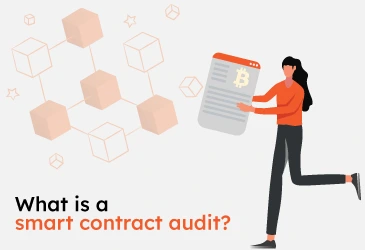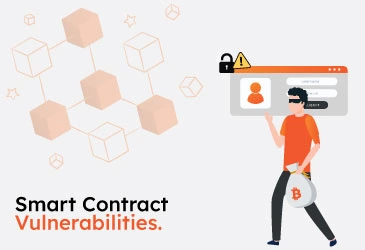Smart Contract Audit Checklist
Updated : May 13, 2023

Smart contracts are self-executing agreements with the terms of the agreement between buyer and seller being directly written into lines of code. They are a critical component of blockchain technology and are used in various applications, including cryptocurrency transactions, supply chain management, and digital identity verification. However, the complexity of smart contracts makes them vulnerable to errors, and even minor mistakes can lead to significant financial losses
To ensure the security and reliability of smart contracts, it is crucial to conduct a comprehensive audit. In this blog post, we will provide a smart contract audit checklist that covers all the essential aspects of auditing a smart contract.
Review the Contract's Purpose and Scope
Before beginning the audit, it is important to understand the contract's purpose and scope. Reviewing the contract's documentation, including the white paper and technical specification, will give you a clear understanding of what it is designed to do and how it is expected to function
Check for Coding Standards
Ensuring that the smart contract code adheres to industry-standard coding practices is essential. This will help to prevent common coding errors that can lead to vulnerabilities in the contract's security. Take proactive steps to safeguard your smart contracts with a comprehensive Smart Contract Audit. Some of the coding standards that should be checked include:
Code Commenting
The code should have sufficient comments to explain the purpose and functionality of each section of the code.
Variable Naming Conventions
The variables should be named clearly and descriptively to avoid confusion and make the code more readable
Function And Method Naming Conventions
Functions and methods should be named descriptively and should accurately represent what they do. Learn more about Smart Contract Vulnerabilities.
Review the Smart Contract Architecture
The smart contract architecture should be reviewed to ensure that it is designed to meet the contract's purpose and scope. This includes reviewing the contract's functions, events, and data structures. It is important to ensure that the contract is designed to be scalable and can handle many transactions.
Check For Security Vulnerabilities
The security of the smart contract is paramount, and vulnerabilities can lead to significant financial losses. The following are some of the security vulnerabilities that should be checked:
- Reentrancy attacks occur when a contract is called repeatedly before the first call completes, leading to unexpected behaviors and allowing attackers to steal funds.
- Integer overflow/underflow: This can occur when a variable exceeds its maximum or minimum value, leading to unexpected behaviors and allowing attackers to manipulate the contract's state.
- DoS (Denial-of-Service) attacks occur when attackers flood the contract with requests, overwhelming the contract and making it unavailable for legitimate users.
Test The Smart Contract
Testing the smart contract is critical to ensure it functions as expected and has no vulnerabilities. Testing should include the following:
Unit testing
This involves testing individual functions and methods to ensure they behave as expected. Integration testing involves testing how the contract interacts with other system components.
Load Testing
This involves testing how the contract performs under heavy loads.
Fuzz Testing
This involves testing the contract with various inputs to ensure it can handle unexpected inputs without crashing or behaving unexpectedly.
Verify Compliance With Applicable Laws And Regulations
Smart contracts may be subject to various laws and regulations, including securities, data, and consumer protection laws. Ensuring that the contract complies with all applicable laws and regulations is essential. Discover effective techniques and best practices for auditing smart contracts in our comprehensive blog guide.
Verify the Contract's Business Logic
The contract's business logic should be verified to ensure that it meets the contract's purpose and scope requirements. This includes reviewing the contract's conditions, requirements, and constraints to ensure the code accurately represents them.
Let Us Help You!
Conducting a smart contract audit is crucial for ensuring the security and reliability of blockchain transactions. By following the checklist we have provided, you can ensure that your smart contract is designed to meet its purpose, adheres to coding standards, is secure against vulnerabilities, and complies with applicable laws and regulations.
Contact our team for professional and reliable blockchain development services if you need help with smart contract development and auditing. Trust us to help you build smart contracts that are secure, reliable, and compliant with industry standards
Take control of your smart contract security - Request a professional Smart Contract Audit today and ensure the solidity of your blockchain projects
Insights

What Is A Smart Contract Audit?
Smart contracts are self-executing agreements that run on a blockchain network, allowing for secure and decentralized transactions. Smart contracts ...

How To Audit Smart Contracts?
Smart contracts have become increasingly popular over the years as they provide a more efficient way of executing transactions in a decentralized ...

Smart Contract Vulnerabilities
Smart contracts have revolutionized how we conduct transactions and execute agreements in the digital age. These self-executing programs ...